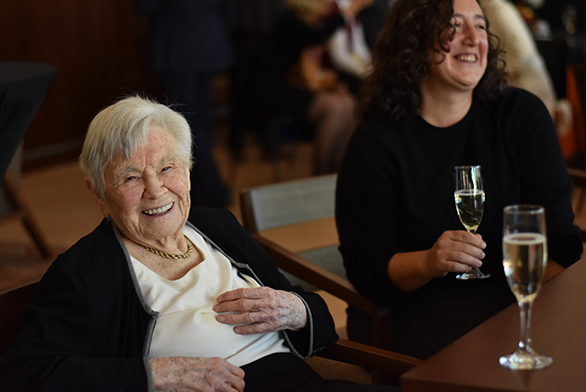Giving Thanks for Annapolis Tutor Eva Brann
November 22, 2023 | By Kirstin Fawcett
What could possibly be said about St. John’s tutor emerita Eva Brann—former Annapolis dean, 2005 recipient of the National Humanities Medal, and one of the school’s longest-serving tutors—that hasn’t already been shouted from the rooftops by generations of devoted students, faculty, and alumni? Plenty, it turns out: enough to warrant a celebratory reception, a series of Brann-inspired lectures, and throngs of greetings from well-wishers during a recent colloquy in her honor organized by Annapolis tutor Peter Kalkavage.

Brann was born in 1929 to Jewish parents in Berlin. Her family was forced to flee Germany for New York City during World War II, where Brann studied at Brooklyn College before receiving her master of arts in classics and a PhD in archaeology from Yale University. She came to St. John’s College in 1957 shortly after receiving her doctorate, and her presence immediately made an impression, recalls Sharon Bishop (A65), former chairman of the college’s Board of Visitors and Governors.
“In the early 1960s, I was a young student, and she was a young tutor, one of only four women on the faculty at that time,” Bishop said in a toast delivered during the colloquy’s opening reception. “Eva was an important person on campus. Even if you didn’t know her, you knew about her. And what we know was that she demonstrated intellectual parity within a male-dominated institution within a broader male-dominated society. To a young woman at St. John’s that was huge.”
Brann’s intellectual prowess loomed large, as did her reputation for productivity. “I walked into her office one Monday morning early in her deanship to thank her for her wonderful opening lecture the Friday night before,” recalled St. John’s president emeritus Christopher B. Nelson in his own toast. Lo and behold, “she had already written the lecture she was to give the following year, 362 days hence.”
Brann’s conversation style is equally efficient. “When walking from my dorm to lunch,” recalled Santa Fe tutor, former dean, and Brann toaster David Levine (A67), “Miss Brann approached me and asked: ‘So, what’s so important about Kant’s Critique of Judgment?’ I was taken aback …What could I say? But that is Eva, the Eva we all have come to admire: direct, no small talk, and focused on the questions, that I, and all of us at the college, should always be asking about each of our books.”
But while unflinchingly direct, Brann is never rigid. She pushes students to think in original ways, and consistently gleans new insights from them in turn. “Many of the conversations Eva has had with us exemplify what I call her improvisational gift,” reflected honorary St. John’s alum Paul Dry, who in 2004 initiated a twice-yearly seminar led by Brann and tutor Sam Kutler. “Questions are asked. Old and new ones. Some are perennial. Without possessing fixed answers, she considers these questions.”
By 1989, Brann had become such a fixture at St. John’s that she was granted the status of honorary alumna. Beloved by not just colleagues but pupils—many of whom, over the decades, would inevitably show up unannounced on her doorstep just to talk philosophy—it’s hard to imagine the college without her, whether as a tutor, administrator, or beloved figurehead. Her very presence at St. John’s, concluded Nelson, “reminded us over and over just who we are, why we make a difference in the world, and why we need to continue to make that difference.”
All four toasts will be printed in full in a future college publication; visit our YouTube channel to watch the colloquy’s Eva Brann-inspired lectures, delivered by tutors Peter Kalkavage, Eric Salem, Joan Silver, and Janet Dougherty.

